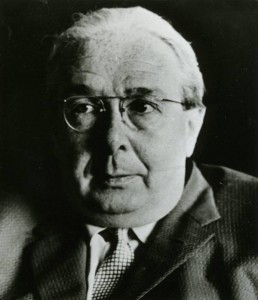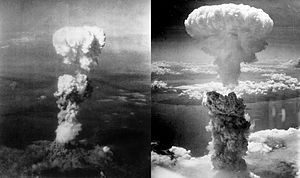Was the use of atomic bombs justified to achieve victory in WWII?
Was the use of atomic bombs justified to achieve victory in WWII in the Pacific on terms satisfactory to the United States?
What do you think?
SUPPORTERS OF THE USE OF THE ATOMIC BOMBS GENERALLY EMPHASIZE THESE BASIC PREMISES:
- The Japanese were the aggressors, starting with the drive for Manchuria in 1931
- The Japanese were not ready to surrender
A political stalemate had developed between the military and civilian leaders of Japan, the military increasingly determined to fight despite all costs and odds and the civilian leadership seeking a way to negotiate an end to the war. The military hoped that if they could hold out until the ground invasion of Japan began, they would be able to inflict so many casualties on the Allies that Japan still might win some sort of negotiated settlement.
Defeat was possible – surrender was impossible.
- Every day the war continued thousands were suffering and dying
My mother would not have survived if the War would have lasted a couple of months longer and I would not have been far behind her. Six months at the most. Dietitians who analyzed the starvation diet in Camp Banjoebiroe 10 and the other camps in Central Java all concluded that our diet was so deficient that it inevitably would have lead to our death as a result of starvation.
- The use of the atomic bombs saved many more lives than it took, including Japanese military and civilian lives, and was preferable to the planned invasion
Winston Churchill expressed this point eloquently and succinctly in a speech to the British House of Commons in August 1945 in his capacity as Leader of the Opposition:
“There are voices which assert that the bomb should never have been used at all. I cannot associate myself with such ideas. . . . I am surprised that very worthy people—but people who in most cases had no intention of proceeding to the Japanese front themselves—should adopt the position that rather than throw this bomb, we should have sacrificed a million American and a quarter of a million British lives.”
In his surrender speech of August 15, 1945, Emperor Hirohito said:
“ Moreover, the enemy has begun to employ a new and most cruel bomb, the power of which to do damage is, indeed, incalculable, taking the toll of many innocent lives. Should We continue to fight, not only would it result in an ultimate collapse and obliteration of the Japanese nation, but also it would lead to the total extinction of human civilization.
Such being the case, how are We to save the millions of Our subjects, or to atone Ourselves before the hallowed spirits of Our Imperial Ancestors? This is the reason why We have ordered the acceptance of the provisions of the Joint Declaration of the Powers.”
PEOPLE OPPOSED TO THE USE OF THE ATOMIC BOMBS STRESS THE FOLLOWING POINTS:
- The bombings were fundamentally immoral
General Curtis LeMay, a fierce warrior who directed all strategic air operations against the Japanese home land, is quoted to have said, “If we’d lost the war, we’d all have been prosecuted as war criminals.”
What makes it immoral if you lose and not immoral when you win?
- The bombings were war crimes and crimes against humanity
 I had a couple of personal encounters with the physicist Leo Szilard in the early 1960’s when he lived in a house in La Jolla, CA owned by my boss/partner.
I had a couple of personal encounters with the physicist Leo Szilard in the early 1960’s when he lived in a house in La Jolla, CA owned by my boss/partner.
Leo Szilard had proposed accelerating the atom bomb research in a letter to President Roosevelt he wrote in 1939 for Albert Einstein’s signature and he played a major role in the Manhattan Project that produced the first atomic bombs. Towards the end of the war he became opposed to the bombs on the moral issues and argued indirectly, similar to Curtis LeMay, that we would have defined the dropping of atomic bombs on cities as a war crime.
U.S. News & World Report had published an interview with Leo Szilard in 1960 that was interesting to me because of what he did say and even more because of what he did not go into. It handed me plenty to bring up to him during our short encounters. My main point, of course, was that the use of the bombs saved more lives than it sacrificed. It saved an inestimable number of lives including the lives of my parents, my brother and me and of a large percentage of some 400,000 – 500,000 prisoners of war and internees. He was patient with a young whippersnapper half his age while making it clear that he felt more strongly opposed to the atomic bomb as time went by. He was a kind and humble man, without any affectations. He would have been a wonderful uncle.
- The bombings were militarily unnecessary to win the war.
The entry of the Soviet Union in the war on August 8, 1945 was more decisive than the atomic bombs. Without the Soviet entry in the war by invading Manchuria, the Japanese would have continued to fight.
- The dropping of the second bomb on Nagasaki, 3 days after Hiroshima, was certainly unnecessary
- The bombings were state terrorism
So, what do you think?
Please give us your opinion by posting a Comment below


Was the use of the Atomic Bomb necessary? Being a child of parents who had lived for three and a half years in a concentration/internment camp on the island of Sumatra, I say simply, “Yes.” My mother told me, and I recently read a confirmation about this, that the Japanese had already set up machine guns around the camp grounds to annihilate everyone therein–but the people were spared because of the bombs. Was it inhumane–war is inhumane. There are no real winners in war. What the Japanese did to thousands of civilians from Korea, through China, the Philippines, and south east Asia was far from humane. Placing men in pig’s baskets, naked and tied up and drop them into the sea? Transporting prisoners of war in merchant ships under the Japanese flag pretending that they had no Allies on board and thus were torpedoed was humane? Building of the Burma Railway was humane? Yes, the dropping of the bomb was necessary because Japan did not value human life the way a civilized nation should. Granted many civilians lost their lives, but more were spared, and thousands were freed. …and Japan has become a great nation in spite of it or because of it. That question at this point is moot.
I have only recently read some of the horrific ways the Japanese tortured and starved the prisoners of war. The Atom bomb in my opinion was the only way to sway their superior way of thinking – they were going to control the world. The body count was already too high for the prisoners and it would have been astronomical had this not taken place. I am amazed that so many survived the cruelty that was imposed on them. This is a story that must be told. The way to end the war was a tough call but I am thankful that the decision was made. We have some amazing people that survived and now we need to hear their story. Unfortunately even with the story told we don’t seem to change the cruelty in our world. Let’s hope this story opens some eyes to the destruction that is caused when a group of people believe it is their right to control and destroy others for their agenda.
Thank you for your encouragement, Sharon.
Ever since Laura Hillenbrand’s book “Unbroken” came out, people have written me to say that “this story must be told”. Not only the story of the military prisoners of war in South East Asia during WWII but particularly the story of the civilian prisoners of war under the Japanese – of the women and children. People imply in this statement that very little of this story has been told and some of you specifically ask why this is.
There is a short answer: We were liberated out if the clear blue sky by the atomic bomb. Europe was liberated sloggingly by generals with armies and tanks followed by swarms of journalists, photographers and filmmakers, who filled the newspapers, magazines and Movietone newsreels with the latest news of the European Front. The War in the Pacific was over in a flash and the world immediately turned its back to it and decided to immediately forget it. It was over.
The story of the women and children in concentration camps under the Japanese during WWII, the story of “with nothing but our lives”, will be told with the help and encouragement of all of you.
Japan paid the price for their sanguine drive for imperial domination of SE Asia. It may have been a terrible price to pay, but countless millions of lives would have been lost had the war continued many months longer – including yours, Leo, and my own. Japanese camp commandants had received written instructions in June 1945 to execute all prisoners (over 500,000) and obliterate all traces of the concentration camps on a certain day in September. I believe it was 13th, but I could be wrong there. The atom bombs were dropped barely a month before the orders were to be put into effect. Just one more thing – the bombs clearly demonstrated to the world that a nuclear war would annihilate all life on earth. If the lesson was not learned in 1945 atom/hydrogen bombs would undoubtedly have been used in a later war (perhaps Korea, Vietnam?). The world learned at Japan’s expense.
Thanks, Peter, for your comment here in addition to your comment under “Please help me get this story told”.
You point out the same thing that I mentioned in my “Delivery of key components of Hiroshima atomic bomb” blog post: We would not have survived if the bombs had not been used.
Leo
The day set for liquidating all prisoners of war, including women and children, was set for August 26, 1945. Only just recently they found proof of that. These documents you can find on the internet. Indeed we would not have lived, we were almost dead anyway so it would be easy for the Japanese to get rid of all weak women and children. We had to dig our own trenches my mother had told me.